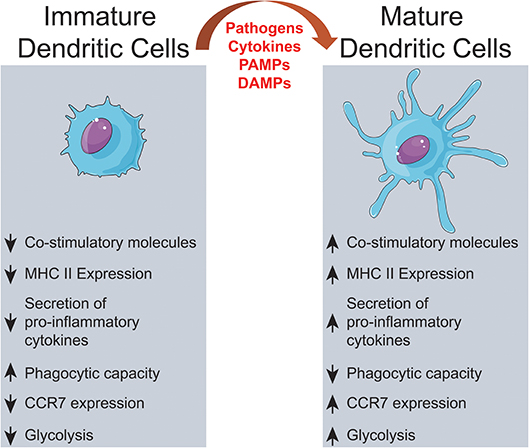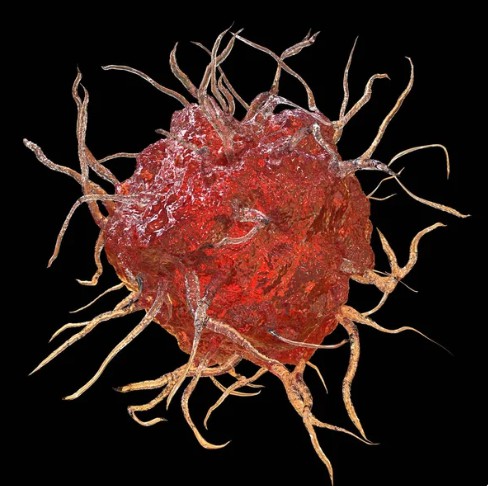Dendritic Cell Activation
Related Symbol Search List
- CD22
- CD300C
- CD300E
- CD300LF
- CD320
- CD33
- CLEC1B
- CLEC2A
- CLEC5A
- GPNMB
- HSP90B1
- IFI30
- KLRB1
- LILRA3
- LILRA4
- LTB4R
- LTB4R2
- PILRB
- SIGLEC10
- SIGLEC11
- SIGLEC14
- SIGLEC5
- SIGLEC6
- SIGLEC7
- SIGLEC8
- SIGLEC9
- SLAMF8
- TREM1
- TREM2
- TREML1
- TRPV1
- TRPV3
Immunology Background
Available Resources for Studying Dendritic Cell Activation
- Creative BioMart offers a wide range of products related to dendritic cell activation-related research, such as recombinant proteins.
- We understand that each researcher may have unique needs and requirements, and our experienced team can deliver tailored solutions.
- In addition to our products and services, we offer a wealth of resources for your reference. These resources cover various aspects of dendritic cell activation, including involved pathways, protein functions, interacting proteins, articles, research areas, and other relevant topics.
Our Featured Products
- Active Recombinant Human CD22 Protein, His-tagged, FITC conjugated
- Recombinant Human CD300C, His tagged
- Active Recombinant Human CD33 Protein, Fc-tagged, Alexa Fluor 555 conjugated
- Recombinant Human CLEC1B, GST-tagged
- Recombinant Human CLEC5A, His-tagged
- Active Recombinant Human GPNMB Protein, Fc-tagged, Alexa Fluor 555 conjugated
- Recombinant Human IFI30, GST-tagged
- Recombinant Human KLRB1 protein, His-tagged
- Active Recombinant Human LILRA3 Protein, His-Avi-tagged, Biotinylated
- Recombinant Human LILRA4, His-tagged
- Recombinant Human PILRB, GST-tagged
- Recombinant Human SIGLEC14 protein, His-tagged
- Recombinant Human SIGLEC5 Protein, hIgG-His-Tagged
- Recombinant Human SIGLEC6, Fc tagged
- Recombinant Human SIGLEC8, His-tagged
- Recombinant Human SIGLEC9, GST-tagged
- Recombinant Human SLAMF8, His-tagged
- Recombinant Human TREM1 protein (Met1-Arg200), His-tagged
- Recombinant Human TREML1, GST-tagged
- Recombinant Human TRPV1 Protein, His-tagged
- Recombinant Human TRPV3 Protein, His-tagged
About Dendritic Cell Activation
Dendritic cells (DCs) are a type of immune cell that play a crucial role in initiating and regulating immune responses. They act as sentinels in the body, constantly surveying their environment for pathogens, foreign substances, and cellular abnormalities. When DCs encounter these stimuli, they undergo a process called dendritic cell activation, which is essential for triggering an effective immune response. Here's an introduction to dendritic cell activation:
- Dendritic Cell Types: Dendritic cells exist in various tissues and can be broadly categorized into conventional dendritic cells (cDCs) and plasmacytoid dendritic cells (pDCs). cDCs are found in peripheral tissues, while pDCs are primarily present in the blood and lymphoid organs. Both types of DCs can undergo activation in response to immune signals.
- Recognition of Pathogens: Dendritic cells possess pattern recognition receptors (PRRs) on their surface, such as Toll-like receptors (TLRs), which can recognize specific molecular patterns associated with pathogens, known as pathogen-associated molecular patterns (PAMPs). When a DC encounters a pathogen, PRRs on its surface bind to PAMPs, initiating the activation process.
- Antigen Uptake and Processing: Upon encountering pathogens or foreign substances, activated dendritic cells engulf and internalize them through a process called phagocytosis. The captured antigens are then processed within the DCs, broken down into smaller fragments, and loaded onto major histocompatibility complex (MHC) molecules.
- Co-stimulatory Molecule Expression: Dendritic cell activation leads to the upregulation of co-stimulatory molecules, such as CD80, CD86, and CD40, on the surface of DCs. These molecules serve as signals to other immune cells, such as T cells, to initiate an immune response.
- Migration to Lymphoid Organs: Activated dendritic cells undergo changes in their surface molecules and migrate from peripheral tissues to nearby lymphoid organs, such as lymph nodes. In the lymphoid organs, they present processed antigens to T cells, which are essential for the activation of adaptive immune responses.
- T Cell Activation: Within lymphoid organs, activated dendritic cells interact with naïve T cells. They present the processed antigens, along with co-stimulatory signals, to T cell receptors (TCRs) on the surface of T cells. This interaction stimulates T cell activation, leading to the proliferation and differentiation of antigen-specific T cells into effector T cells.
- Cytokine Secretion: Activated dendritic cells secrete various cytokines, such as interleukin-12 (IL-12) and interferons, which further contribute to immune cell activation and polarization. These cytokines help shape the type of immune response generated, such as promoting Th1 or Th2 responses.
- Tolerance Induction: In addition to activating immune responses, dendritic cells also play a role in inducing immune tolerance. In certain situations, DCs can present self-antigens to T cells in a way that promotes tolerance and prevents harmful immune responses against the body's own tissues.
Overall, dendritic cell activation is a complex process that involves antigen recognition, antigen presentation, co-stimulatory molecule expression, migration, interaction with T cells, and cytokine secretion. This process is pivotal in initiating and regulating both innate and adaptive immune responses, ultimately leading to effective immune defense against pathogens and other foreign substances.
 Fig.1 Dendritic cells activation. (Patente TA, et al., 2019)
Fig.1 Dendritic cells activation. (Patente TA, et al., 2019)
Extracellular signals, such as PAMPs or DAMPs, trigger alterations on immature DCs culminating on significant changes on surface proteins, intracellular pathways and metabolic activity.
The Biological Significance of Dendritic Cell Activation
The activation of dendritic cells holds significant biological importance due to their pivotal role in immune responses. Here are some key biological significances of dendritic cell activation:
- Initiation of Adaptive Immune Responses: Dendritic cell activation is crucial for initiating adaptive immune responses against pathogens. Activated DCs capture and process antigens from pathogens, and then present these antigens to T cells in lymphoid organs. This interaction between activated DCs and T cells triggers the activation and proliferation of antigen-specific T cells, leading to the development of adaptive immune responses, including the generation of effector T cells and the production of specific antibodies.
- Bridge between Innate and Adaptive Immunity: Dendritic cells act as a bridge between the innate and adaptive immune systems. They possess pattern recognition receptors (PRRs) that recognize pathogen-associated molecular patterns (PAMPs) on pathogens. Upon activation, DCs process and present antigens derived from pathogens to T cells, thus connecting the innate immune recognition of pathogens to the initiation of adaptive immune responses.
- Immune Surveillance and Detection of Danger Signals: Dendritic cells constantly survey their environment, including peripheral tissues, for the presence of pathogens, foreign substances, and cellular abnormalities. When activated, DCs recognize danger signals, such as pathogen invasion or tissue damage, and respond by activating immune responses. This immune surveillance by activated DCs helps in the early detection and response to potential threats, contributing to host defense against infections and cancer.
- Regulation of Immune Tolerance and Autoimmunity: Dendritic cells also play a critical role in regulating immune tolerance and preventing autoimmune responses. Under certain conditions, activated DCs can present self-antigens to T cells in a way that promotes immune tolerance, leading to the suppression of harmful immune responses against the body's own tissues. This process helps maintain immune homeostasis and prevent autoimmune diseases.
- Induction of Memory Responses: Dendritic cells are involved in the generation of immunological memory, which is the ability of the immune system to remember and mount a faster and more robust response upon re-exposure to a previously encountered pathogen. Activated DCs contribute to the development of long-term memory T cells and B cells, which provide rapid and efficient immune responses upon subsequent encounters with the same pathogen.
- Regulation of Immune Polarization: Activated dendritic cells secrete various cytokines that influence the polarization of immune responses. Through the production of specific cytokines, DCs can direct T cell differentiation towards different subsets, such as Th1, Th2, Th17, or regulatory T cells (Tregs). This regulation of immune polarization by activated DCs helps tailor immune responses to combat specific types of pathogens or immune challenges.
In summary, dendritic cell activation is of profound biological significance as it initiates adaptive immune responses, acts as a bridge between innate and adaptive immunity, detects danger signals, regulates immune tolerance, induces memory responses, and influences immune polarization. These functions collectively contribute to effective host defense, maintenance of immune homeostasis, and prevention of autoimmune diseases.

If you have any questions, requirements, or cooperation intentions, please feel free to contact us. We very much look forward to working with you and helping you achieve research and commercial success.
References:
- Patente TA, Pinho MP, Oliveira AA, Evangelista GCM, Bergami-Santos PC, Barbuto JAM. Human Dendritic Cells: Their Heterogeneity and Clinical Application Potential in Cancer Immunotherapy. Front Immunol. 2019;9:3176. Published 2019 Jan 21. doi:10.3389/fimmu.2018.03176
- Reis e Sousa C. Activation of dendritic cells: translating innate into adaptive immunity. Curr Opin Immunol. 2004 Feb;16(1):21-5. doi: 10.1016/j.coi.2003.11.007. PMID: 14734106.
- Cella M, Salio M, Sakakibara Y, Langen H, Julkunen I, Lanzavecchia A. Maturation, activation, and protection of dendritic cells induced by double-stranded RNA. J Exp Med. 1999;189(5):821-829. doi:10.1084/jem.189.5.821
- Vroman H, van den Blink B, Kool M. Mode of dendritic cell activation: the decisive hand in Th2/Th17 cell differentiation. Implications in asthma severity?. Immunobiology. 2015;220(2):254-261. doi:10.1016/j.imbio.2014.09.016
- Massullo P, Druhan LJ, Bunnell BA, et al. Aberrant subcellular targeting of the G185R neutrophil elastase mutant associated with severe congenital neutropenia induces premature apoptosis of differentiating promyelocytes. Blood. 2005;105(9):3397-3404. doi:10.1182/blood-2004-07-2618

